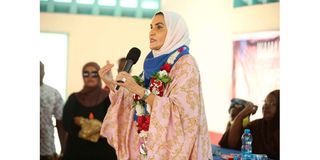Campaigning in hijabs: The Muslim women breaking barriers

Rahma Shahbal, campaigns for her husband Suleiman Shahbal, who hopes to clinch the Mombasa gubernatorial post in the August 9 poll.
What you need to know:
- More Muslim women are now taking active roles in campaign trails to assist their spouses in vote hunting.
- Rahma Shahbal, the wife of Mombasa gubernatorial aspirant Suleiman Shahbal, has decided to join her husband in the campaign trail.
- Sheikh Juma Ngao says the religion does not bar women from seeking political posts or participating in campaigns as long as they observe the religious requirements.
Muslim women have shied away from taking active roles in their spouses’ political campaigns.
Majority only show up during the swearing in ceremonies while others completely keep out of public limelight.
Things, however, seem to be changing with more women now taking active roles to assist their spouses hunt for votes.
They are holding strategy meetings behind the scenes and even appearing in public rallies to seek their spouses’ election.
Rahma Shahbal, the wife of Mombasa gubernatorial aspirant Suleiman Shahbal, is among those who have decided to leave the comfort of their homes and join her husband in the campaign trail.
She is taking nothing to chance considering that this is the third time her husband is vying for the seat.
She confesses that she never liked the idea of her husband joining politics, but she had to join him after discussing the matter with him at length.
In an exclusive interview with nation.africa, Ms Shahbal says she accepted to join her husband in campaigns to get a platform to address the plight of women and children, who have not received the necessary support to change their lives.
"He took me to a dumpsite in Mwakirunge where women lived with their new-born children. We also went to Coast General Teaching and Referral hospital, where we found women stranded with their children, they had been treated but did not have money to buy the prescribed drugs," she says.

Rahma Shahbal (waving right) arrives at a political meeting with her husband Suleiman Shahbal.
She observes that this was her turning point and she accepted to join the campaign trail. She wanted to rally voters behind her husband so that they can bring change should her husband succeed in his gubernatorial bid.
"I had no choice but to join the campaigns so that together we can address the challenges women and youth face," she says.
Her target group during her campaign tours are women and the youth.
“When on the camping trail, I not only sell my husband as the favourite candidate, but I also do civic education; I educate mothers and the youth about their rights as voters," she says.
She adds: “You don’t have to bother about being in a hijab, you just focus on your mission,”
National chairman of the Kenya Muslims National Advisory Council (Kemnac) Sheikh Juma Ngao, says Muslim women need their husbands’ permission before openly engaging in public campaigns.
He says the nature of Kenyan politics makes it unappealing to most women who may find it difficult to balance politics and religion that demands them to behave in a certain way.
Dirty game
“Under Islamic Law, a married women is under her husband and, therefore, must seek consent before doing anything include joining politics. But because politics is a dirty game, most men are reluctant to give their consent. But when a couple agrees, there is no problem," he says.
Sheikh Ngao, however, says the religion does not bar women from seeking political posts or even participate in campaigns as long as they observe the religious requirements.
Ms Shahbal is quick to point out that her decision has been met with criticism. Some people abuse her on social media, telling her husband that he is trading her for votes.
She acknowledges that even non-Muslim women face similar challenges.
Ms Shahbal is, however, not giving up because of the positive comments she receives from friends and supporters who believe in what she is doing.
“This motivates me to keep going with my campaigns. But am ready for it because in politics, I expect to be told dirty things,” she adds.
She says women should stand for their rights and help in bettering the society.
Women's rights
“Nobody will fight for women’s rights until they come out and do it themselves," she says.
Another woman Nana Mote, is vying for Lamu Woman Rep position. She says she joined politics after discussing the matter with her husband, her main financier.
“I would not have joined the race had he declined. You know I don't want to be divorced," says Ms Mote, a clerical officer at Kenya Ports Authority.
According to her, nothing stops a Muslim woman for achieving her political dream as long as necessary consent is obtained from the husband.
Her marriage is as important as her other dreams, she says, noting that it is advisable that couples agree on what they want to avoid unnecessary separation.
Prof Halimu Shauri of Pwani University says religion and culture have traditionally prohibited women from mingling with men.
He says many African cultures expected women to take care of their homes while the men went out and provided for the family.
Gender equality
"Patriarchy gives men more power than women in decision making and political participation. However, there is a lot of pressure to expand the space for women’s participation in politics and decision making position," he says.
Prof Shauri adds that feminism movement and gender equality push is beginning to bear fruits by breaking politico-cultural barriers for women.
“Women are now increasingly coming out to vie for political offices and campaign for themselves and their husbands. However, more push is still needed for women to mobilize and rally their fellow women," he says.
The professor of sociology says the International Women’s Day coming up next week is an example of efforts to empower women.
Ms Shahbal and her husband have intensified campaigns to succeed Governor Ali Hassan Joho, who is serving his second and last term.
The businessman will face Mvita MP Abdulswamad Nassir in the party primaries for Orange Democratic Movement (ODM) ticket before facing aspirants from other parties.
Those eyeing the seat are former Senator Hassan Omar (United Democratic Alliance), Kisauni MP Ali Mbogo, Deputy governor William Kingi and former Nyali MP Hezron Awiti Bolo amongst others.
Mr Shabhal, Mr Nassir and Mr Mbogo are considered front runners for the seat.




